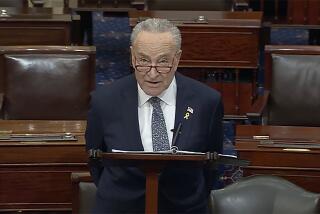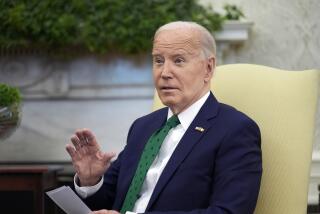U.S. Asks PLO, Israel to Ease Election Stands
- Share via
TUNIS, Tunisia — The United States said Monday that it considers elections in the Israeli-occupied territories “the next step” in the Middle East peace process and urged the PLO and Israel to modify their stance.
But the Palestine Liberation Organization again rejected an election proposal for the occupied West Bank and Gaza Strip proposed by Israeli Prime Minister Yitzhak Shamir.
In a statement after three hours of talks with a PLO team led by Yasser Abed-Rabho, U.S. Ambassador to Tunisia Robert H. Pelletreau Jr. said, “There is a route that leads to peace in the Middle East.
“And we suggest that the next step, and not the last step, along this route is elections in the occupied territories. Such elections ought to be prepared in such a fashion as to be acceptable to the Israelis and the Palestinians,” Pelletreau said.
“They could then bring a process of political negotiations allowing both sides to modify their fundamental attitudes to lead to a global solution.”
Pelletreau’s statement appeared to mark a shift in Washington’s tactics in mediating between the PLO and Israel, diplomatic sources said. In the past, Pelletreau seemed to concentrate on seeking to foster talks between the PLO and Israel before such elections were held.
Hard-Line Statement
The U.S. envoy, who reportedly called for the latest meeting, made no reference to a hard-line statement issued last week by the PLO’s Fatah faction, led by Yasser Arafat, that drew criticism from the State Department and Israel.
“Our discussions during this fourth meeting were serious and profound,” he said. “We have stated clearly our conviction that the Palestinians must respond to the challenge of constructing a new peace.”
Abed-Rabho, a member of the Democratic Front for the Liberation of Palestine, again rejected the Shamir election plan, saying, “Elections in the occupied territories ought to be in the context of a global plan that leads to an end to the Israeli occupation and the realization of Palestinian rights.”
More to Read
Sign up for Essential California
The most important California stories and recommendations in your inbox every morning.
You may occasionally receive promotional content from the Los Angeles Times.










